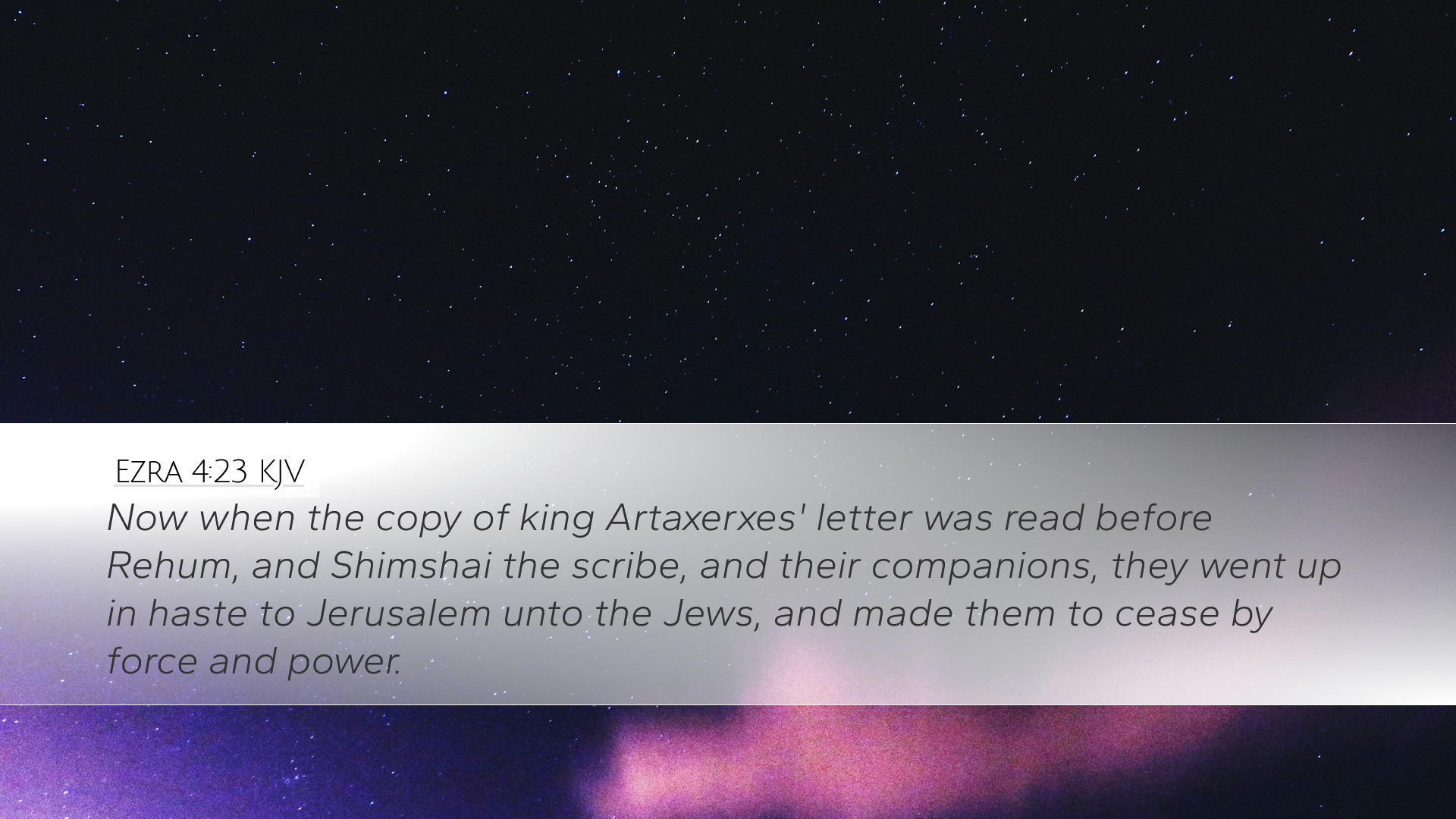Old Testament
Genesis Exodus Leviticus Numbers Deuteronomy Joshua Judges Ruth 1 Samuel 2 Samuel 1 Kings 2 Kings 1 Chronicles 2 Chronicles Ezra Nehemiah Esther Job Psalms Proverbs Ecclesiastes Song of Solomon Isaiah Jeremiah Lamentations Ezekiel Daniel Hosea Joel Amos Obadiah Jonah Micah Nahum Habakkuk Zephaniah Haggai Zechariah MalachiEzra 4:23
Ezra 4:23 KJV
Now when the copy of king Artaxerxes' letter was read before Rehum, and Shimshai the scribe, and their companions, they went up in haste to Jerusalem unto the Jews, and made them to cease by force and power.
Ezra 4:23 Bible Commentary
Commentary on Ezra 4:23
Verse Text: "Now when the copy of King Artaxerxes' letter was read before Rehum and Shimshai the scribe, and their companions, they went up in haste to Jerusalem unto the Jews, and made them to cease by force and power."
Introduction
This passage in Ezra illustrates a significant moment in the opposition faced by the returning exiles as they sought to rebuild Jerusalem and its temple. The events described uncover the dynamics of power between the Persian Empire and the Jewish leaders, as well as the relentless spirit of opposition that accompanies the work of God’s people. In this commentary, we will explore insights drawn from public domain sources, emphasizing theological perspectives, historical context, and practical applications for today's readers.
Contextual Background
The book of Ezra is set during the return of the Jewish exiles from Babylon and the efforts to restore the temple and Jerusalem. After the initial enthusiasm of the return, opposition arose, as noted in previous chapters. The letter from King Artaxerxes reflects both the legitimate authority of the Persian Empire and the spiritual challenge faced by the returning exiles.
Historical Context
Persian rule during this period allowed for a degree of autonomy for its subjects, yet it was also marked by political maneuvering. The letter read by Rehum and Shimshai was part of the political machinations to intimidate the Jewish people and discourage their efforts.
Thematic Insights
- Authority and Obedience: The authority of King Artaxerxes is emphasized in this verse, showing both the secular power and its limits when it clashes with divine purposes.
- Opposition to God's Work: The forceful attempts to halt the rebuilding of Jerusalem and the temple highlight the spiritual opposition against God’s plans, a theme prevalent throughout scripture.
- Human Response to Adversity: How the Jewish community responds to this pressure is crucial for understanding faith amidst trials.
Commentary from Various Authors
Matthew Henry's Commentary
Henry emphasizes the immediate and forceful response of Rehum and Shimshai as indicative of the persistent opposition God's work often encounters. He notes that they acted "in haste," illustrating how quickly the enemies of God can move to thwart His plans. Henry encourages readers to recognize that divine work will face opposition, yet God remains sovereign. The text serves as a reminder of the faithful endurance called for among God’s people in the face of adversity.
Albert Barnes’ Analysis
Barnes provides a legalistic perspective on the situation, examining the implications of the letter from Artaxerxes. He highlights the foundations of authority reflected in the king’s command, and the motives behind the enemies’ actions. Barnes suggests that the Jews were caught in a political and spiritual strife, making it crucial for them to seek guidance and strength from the Lord. His commentary focuses on the necessary balance between obeying earthly authorities and adhering to divine directives.
Adam Clarke’s Observations
Clarke provides a detailed analysis of the power dynamics at play. He points out the fear and distrust that often characterize relationships between ruling powers and local populations. Clarke delineates the corrupt intentions of Rehum and Shimshai, revealing a desire to maintain control and suppress the Jewish community. He implores modern readers to take to heart the lessons of resilience and reliance on God’s faithfulness, particularly when faced with injustices that feel overwhelming.
Theological Reflections
- The Nature of God’s Sovereignty: The events recorded in Ezra unfold under the sovereign hand of God. Even in opposition, God retains ultimate control over history and the affairs of humanity.
- The Role of Faithfulness: The Jewish exiles are exemplars of faithfulness amidst adversity. Their commitment to rebuilding, in spite of opposition, speaks to the challenge of remaining steadfast in God’s calling.
- Understanding Opposition: This passage teaches that opposition to God’s work is often an expected element of the Christian journey. Understanding this can fortify believers in their faith as they encounter similar trials.
Practical Applications for Today
For pastors, students, and theologians, Ezra 4:23 is more than just a historical account; it serves as a reminder that the work of God often encounters opposition. Here are some applications:
- Encouragement in Ministry: This passage acts as an encouragement for pastors and church leaders who face resistance in their ministries. Remembering that God’s work often faces challenges can provide solace in tough circumstances.
- Lessons in Advocacy: Understanding the balance of obeying earthly authority while maintaining faithfulness to God can guide theological discourse and practice in contemporary society.
- Resilience in Faith: The Jewish exiles teach us about the importance of resilience and collective support within faith communities when confronted by external pressures.
Conclusion
Ezra 4:23 encapsulates a critical moment of tension between divine purpose and earthly opposition. Reflecting on the insights from Matthews Henry, Albert Barnes, and Adam Clarke enhances our understanding of both the historical context and the theological implications. As we contemplate this verse, let it serve as a beacon of hope for resistance against adversities faced in our spiritual journeys, affirming that God's sovereign plan will prevail despite the odds aligned against it.


